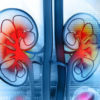Peptic ulcer disease is a term that describes sores that develop in the lining of the stomach. The experienced gastroenterology specialists at Bergen Medical Associates assist patients with diagnoses and treatments for ulcers. Become familiar with the causes and symptoms of this often painful condition. Medical care for ulcers is available in northern New Jersey, at any of our six convenient locations.
Ulcer
Ulcer Diagnosis and Treatment in Northern New Jersey
What Is an Ulcer?
 Peptic ulcer disease is a condition that occurs when open sores, otherwise known as ulcers, form in the gastrointestinal system. Ulcers in these areas are called peptic ulcers and are further differentiated by their location in the body:
Peptic ulcer disease is a condition that occurs when open sores, otherwise known as ulcers, form in the gastrointestinal system. Ulcers in these areas are called peptic ulcers and are further differentiated by their location in the body:
- Gastric ulcers develop inside the stomach
- Esophageal ulcers develop inside the esophagus
- Duodenal ulcers develop in the small intestine
The stomach secretes a thick layer of mucus that protects tissues that line these organs from harsh stomach acid and microbes. The acid helps digest food and kill harmful microbes. When the protective mucus is damaged, the digestive acids damage the tissues in the gastrointestinal system. When this causes open sores, they are called ulcers.
What Causes Ulcers?
Peptic ulcer disease can develop for several reasons. The main cause of gastrointestinal ulcers is a type of bacteria, H. pylori. While H. pylori is commonly found in humans, it often goes undetected and causes no problems. It is believed that most people come in contact with H. pylori in childhood, but doctors do not completely understand how it is introduced.
There are a few other fungi, viruses, and bacteria that also cause ulcers.
Several other factors may lead to peptic ulcers:
- Nonsteroidal anti-inflammatory drugs (NSAIDs), when taken frequently
- NSAIDS when taken in combination with other high-risk medications, such as corticosteroids
- Smoking, chewing tobacco, and alcohol, as these may lead to some chronic diseases and cancers
- Surgery and medical procedures related to the stomach or duodenum
- Blockages or injuries that restrict blood flow to the stomach
- Crohn’s disease and other inflammatory bowel diseases
- Zollinger-Ellison syndrome, a rare condition that increases stomach acid production
- Radiation treatments
- Stress
What Are the Symptoms of Ulcers?
Usually, patients experience dull pain in the abdomen when they have peptic ulcers. This pain may intensify when the stomach is empty and temporarily improve when eating, drinking, or taking antacids.
Other symptoms include:
- Loss of desire to eat, feeling full, and unexplained weight loss
- Nausea, vomit that may look like coffee grounds, and bloating
- Acid reflux and heartburn pains in the chest area
- Stools that are dark colored and tar-like, or bloody
- Anemia
Patients who experience any of these symptoms should make an appointment with a qualified medical professional or gastroenterologist.
How Are Ulcers Diagnosed?
Several tests may be used to diagnose an ulcer, depending on the patient’s overall condition and symptoms. These include:
- Stool, breath, and blood tests to rule out H. pylori
- Endoscopy, in which the stomach and small intestine are examined with a camera inserted through the mouth
- Upper gastrointestinal examination with an X-ray after the patient drinks barium to enhance the imaging process
What Are Treatment Options for Ulcers?
Bacterial infections, including H. pylori, are treated with antibiotics and medications that reduce stomach acid production. If the ulcer is not related to bacteria, physicians may recommend proton pump inhibitors (PPIs) to help reduce stomach acid and heal the ulcer. Other treatments include prescription acid blockers and other medications.
Patients should notify medical professionals when experiencing symptoms of peptic ulcers because they can worsen and cause severe problems, sometimes requiring surgical intervention. It is best to catch an ulcer diagnosis early when it often can be treated successfully with medications.
Frequently Asked Questions About Ulcers
Here are some common questions:
How Long Do Ulcers Last?
An ulcer can last several months or longer, depending on severity.
Can Stress Cause an Ulcer?
This is a common misconception. Stress does not cause ulcers. However, stress can lead to an upset stomach, which can make an existing ulcer worse.
Do Ulcers Heal Themselves?
This can sometimes happen, but ulcers tend to recur. It is best to see a gastroenterologist for accurate diagnosis and treatment.
Ulcer Diagnoses and Treatments at Bergen Medical Associates
The physicians at Bergen Medical Associates are board-certified gastroenterologists who have diagnosed and treated a variety of conditions, including ulcers. Patients experiencing abdominal pain or other symptoms of ulcers should contact Bergen Medical Associates for an examination. The team leads in comprehensive care for all gastrointestinal diseases and disorders in northern New Jersey. Contact Bergen Medical Associates for an appointment today at one of our convenient locations.










